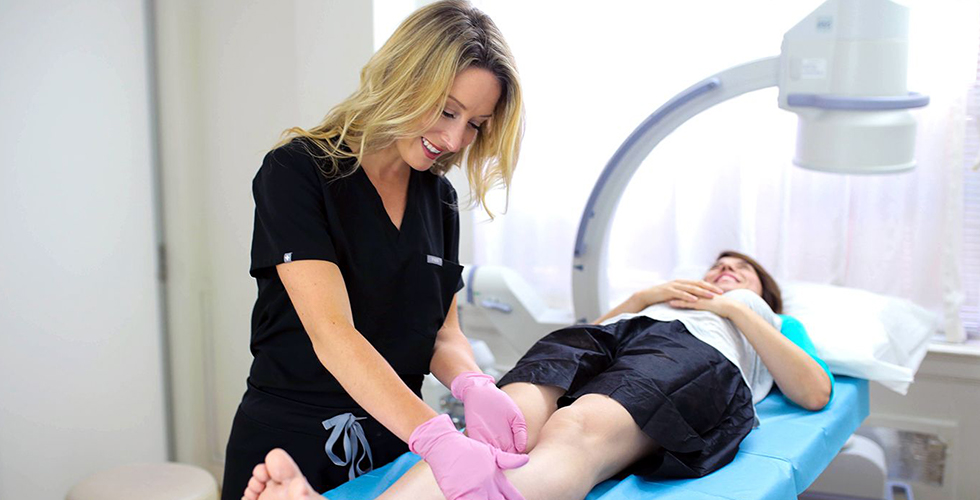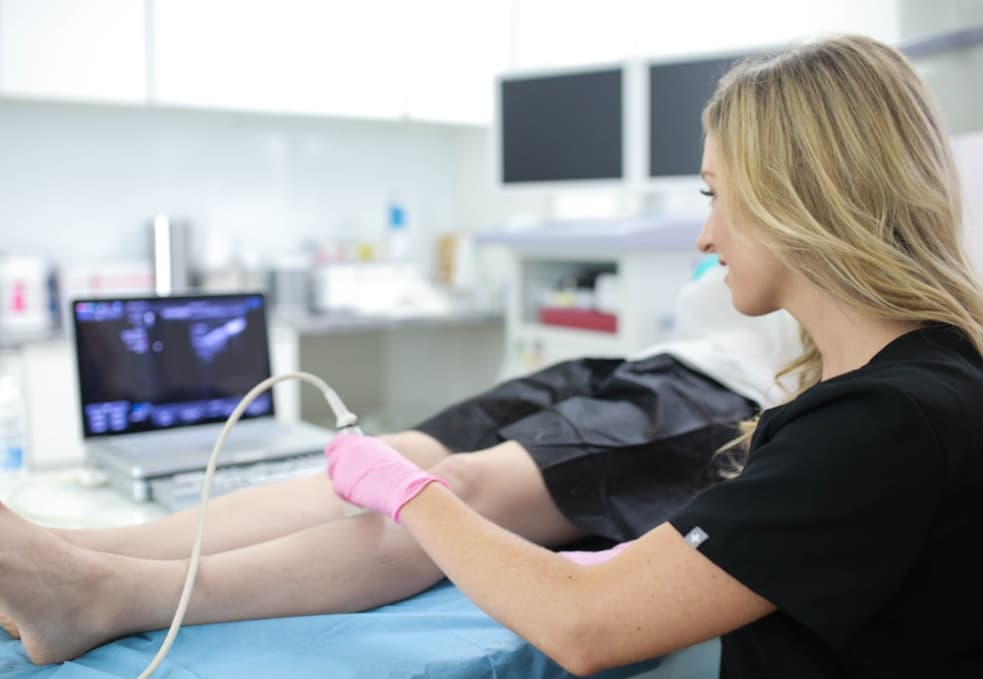Should I go to the doctor for varicose veins?
If you’re considering whether or not to go to the doctor for varicose veins, the answer is yes – without a doubt! Varicose veins can be severely uncomfortable and sometimes lead to other, more serious health issues. Treating varicose veins may seem intimidating, but your vein doctor is there to help you learn about your options so that you can make an informed decision about the best way to manage them.
Varicose veins occur when your veins don’t sufficiently pump blood back to your heart. The veins may become swollen, discolored, and twisted when this occurs. While they’re initially harmless and don’t pose medical threats, they may be uncomfortable and cause pain, itching, or heaviness in the legs. Over time, however, the continued accumulation of blood in leg veins because of chronic venous insufficiency may lead to leg ulcers, deep vein thrombosis, and other complications. That’s why you must seek varicose vein treatment without delay.
At your doctor’s appointment, the doctor will perform a thorough physical examination and imaging tests, such as duplex ultrasound, to confirm the diagnosis and provide more information about the severity of the condition. If necessary, the vein doctor may recommend minimally invasive treatments, such as sclerotherapy, laser ablation, or radiofrequency ablation, to reduce discomfort, improve your overall symptoms, and treat the root cause of varicose veins. Fortunately, minimally invasive procedures do not require hospitalization.
When it comes to varicose veins, going to the doctor is the first and most important step in properly managing the condition. With a proper diagnosis and treatment plan, you can greatly reduce discomfort and enjoy your daily activities without worrying about your varicose veins. So if you’re considering whether or not to seek medical help for your varicose veins, the answer is an emphatic yes! A vein doctor’s appointment is the best place to start when it comes to getting your varicose veins under control.
Long Island Vein Treatment is the ideal group of medical centers for vein treatment in Long Island. You can find our state-of-the-art medical centers for vein treatment in West Islip, Jericho, Port Jefferson, and Hampton Bays. If you’re in or around the north shore, you can find our medical center for vein treatment at 350 Jericho Turnpike Suite 1A, right off the Long Island Expressway. Our vein doctors always diagnose and treat the root cause of varicose veins using the least invasive procedures.
Please schedule an appointment to explore your varicose vein treatments in Long Island.

How to get rid of swollen varicose veins?
If you are dealing with swollen varicose veins, you know the frustration that can come along with them. Not only are they unsightly and uncomfortable, but they can also be a sign that something is wrong with the veins in your legs. Luckily, there are ways to reduce or even turn back the clock and eliminate those varicose veins.
- Compression stockings are one of the most common treatments for varicose veins. These stockings put pressure on the veins in your legs, helping to reduce their size and discomfort. You can buy them in most pharmacies, or your doctor may prescribe them. Wearing compression stockings regularly can help reduce or even eliminate the appearance of swollen varicose veins.
- Endovenous laser ablation is another procedure you may want to consider. During this procedure, a laser is used to create tiny burns on the walls of the veins. This helps to seal them off, preventing blood from being able to flow through them. The procedure is minimally invasive and doesn’t require any significant downtime.
- Radiofrequency ablation is a similar procedure to endovenous laser ablation. The procedure uses a small probe to create controlled heat that causes the veins to shrink and seal off. This procedure is also minimally invasive, and the recovery time is generally shorter than with endovenous laser ablation.
- Ambulatory phlebectomy is a surgical procedure that can be used to treat varicose veins. It involves making several small incisions in the leg to allow the surgeon to remove the veins.
My varicose vein hurts when I walk: what should I do?
Varicose veins can be painful and uncomfortable, so it is important to take steps to treat them. If your varicose vein hurts when you walk, the best thing to do is talk to your doctor. They can discuss potential treatment options, such as compression stockings, specialized exercises, or minimally invasive varicose vein treatments. Discussing the best treatment plan for your individual needs is important, as this will help you find relief from the pain.
How to treat reticular veins?
If you are looking to treat your reticular veins, a variety of options are available. Depending on the severity of your veins, they may be able to be treated with sclerotherapy, laser ablation, or other minimally invasive procedures. Your doctor can help you decide which treatment option is right for you. With the right treatment, your reticular veins can be eliminated, making you feel more confident in your appearance.
What causes varicose veins?
Varicose veins are a common condition affecting around 20% of adults. It’s caused by weakened valves and walls in your veins, resulting in the blood flow becoming inefficient and pooling in specific veins. Factors such as genetics, age, obesity, pregnancy, hormonal changes, and careers involving a lot of standing can all increase your risk of developing varicose veins.
